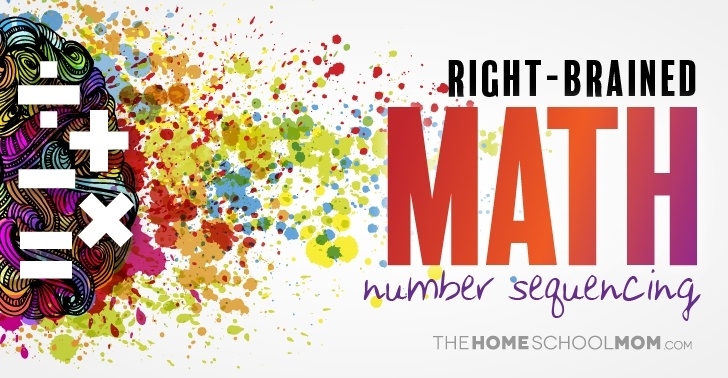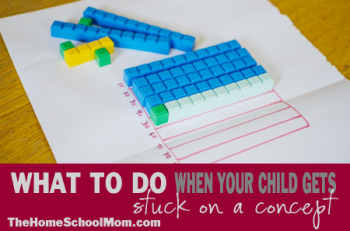If you homeschool long enough, you will likely come across a learning obstacle for your child that makes you want to bang your head against the wall. For us, this concept was number sequencing.

You use different programs, you use creative learning techniques, you incentivize, you, um, maybe yell a little…
All to no avail.
Your child just. doesn't. get. it.
My second grade right-brain oriented, creative global thinker just could not get it. She can rock geometry like a star, write three-point expository paragraphs without assistance, and sew her own doll clothes. But she cannot count numbers in sequence, particularly backwards, effectively. Finding 69 on a number sequence chart (in which they are all in order according to tens) takes a while. Turning to page number 128 is a bit of a challenge.
The transition from the 9 to the 0 was a particular hitch. 45-1=44 was not a problem. 40-1=39 was.
We've tried a variety of math programs. We've learned "decimal street" to help understand place value. We've used manipulatives. We've used sequencing charts. But a fundamental understanding of number sequencing just continued to elude my non-linear, abstract student.
And it was becoming a stumbling block to moving forward in math. If you can't effectively and regularly sequence numbers, you cannot effectively do arithmetic. Oh, my smart, creative gal would usually be able to figure out answers, by doing things like writing down arithmetic problems and "counting up" for subtraction ones. But the concept of number sequence continued to elude her, and mental math was almost an impossibility.
This has absolutely driven me crazy.
I cannot be a writer for TheHomeSchoolMom and have a child who cannot do "76-8" in her head.
OK, so I know that's not true, in theory, but in practicality this issue has made me want to pull my hair out. Trying to work on the problem usually only succeeded in me feeling angry and overwhelmed, and my daughter feeling like a failure.
Not exactly the outcome I wanted from my homeschooling experience.
I knew I needed help in conquering this.
Bringing in the Homeschool Cavalry
I decided to bring in the cavalry.

In one session she made more progress on the issue of number sequencing with my daughter than I have in four years.
Yeah, that didn't exactly bolster my homeschooling self-esteem.
But it did show me just how helpful it is to take a step back, periodically. To get a different perspective. And, sometimes, to just use someone different.
It wasn't that my mother was some miracle worker. She used the very same manipulatives that I have used before. But she did use them in a way that I hadn't yet done previously, and was able to more specifically home in on the precise area of challenge - the transition from 9 to 10. By setting blocks up by tens (10, 20, 30…) and then removing one block at a time ("We have 50 blocks. I'm going to take one away. How many do we have now?"), and also replacing that block ("Now we have 49 blocks. If I put one back, how many do we have now?") over and over again, she was able to help my daughter move past the 9-to-10 hump.
Was it the technique? Was it the relaxed, encouraging attitude my mother (who isn't emotionally attached to this like I am) had with my daughter? Was it the fact that my daughter had more incentive to work harder (and engage her brain) because she was working for someone else other than me?
I suspect it was a little bit of all of that. But the bottom line is that bringing in the cavalry made it happen. It got us past the hump and helped us move forward past the obstacle that has had us stymied for a very long time.
The moral of the story is this...when you're stuck, bring in the cavalry.
Even if you don't have a homeschooling teacher mom who can help you out, find someone. Someone with homeschooling experience who can give you a little help. A homeschooling friend, a teacher in your homeschooling co-op, a fellow homeschooling parent, a homeschool consultant in the community. Tell that person the issue you are having with your child, and have him come and work with your student on the issue. Then watch what they do, and how your student responds.
The truth is, we get stuck. It's one of the (albeit relatively few) downsides of homeschooling. It isn't easy to be the primary person responsible for your child's education, and it is easy to lose perspective on how to best help our children. Sometimes when you're too close to something, you just can't see it clearly.
So when you feel like you're losing the battle against a certain learning issue, bring in the cavalry. It may be all you need for a victory.



 Rebecca Capuano holds a Master of Social Work degree from East Carolina University and is the stay-at-home mom of three children (one of whom is in heaven). She also makes attempts at being a homeschooler, writer, photographer, scrapbooker, and truth-seeker. She has worked in a variety of capacities (including group homes, day treatment centers, and public schools) with at-risk children and staff, including developing a therapeutic and educational day treatment center for delinquent youth in Wilmington, North Carolina. She currently resides in Virginia. Rebecca believes that family is created by God as the most fundamental institution in society, and she is dedicated to helping families nurture their children to become responsible persons of character and integrity.
Rebecca Capuano holds a Master of Social Work degree from East Carolina University and is the stay-at-home mom of three children (one of whom is in heaven). She also makes attempts at being a homeschooler, writer, photographer, scrapbooker, and truth-seeker. She has worked in a variety of capacities (including group homes, day treatment centers, and public schools) with at-risk children and staff, including developing a therapeutic and educational day treatment center for delinquent youth in Wilmington, North Carolina. She currently resides in Virginia. Rebecca believes that family is created by God as the most fundamental institution in society, and she is dedicated to helping families nurture their children to become responsible persons of character and integrity.
My son struggles with numbers too and i am curios to know what curriculum worked for your daughter in the end. I see that you have changed quite a few..but do you feel like you found something that was a good fit for her?
Funny - I have an 8 year old who struggles with a particular concept and recently it has begun to stump me. I need to step back and recognize that there may be things that take extra time for a child to grasp and I may not be the one to finally help her see the light. Thanks
I am so glad I read this post! My son who is 7 and in first grade is having the exact same issue, this really makes me feel better. Next year we will be homeschooling, and this year the school is going to do an iep for him, but as late in the year as it is, that is kind of pointless. Thank you for the ideas!